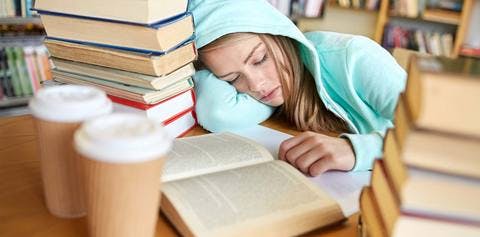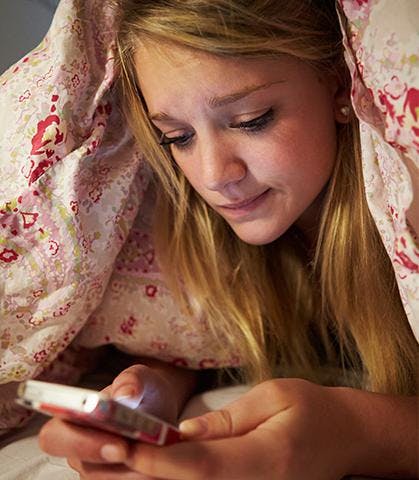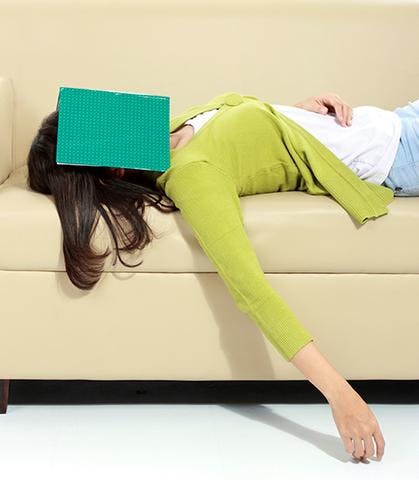Are your teenagers having trouble sleeping?

Now that your child is at secondary school and starting to become independent, you probably think the sleepless nights for them (and you) are over. Unfortunately that might not be the case! As your child grows into a teenager, they have a whole new set of problems that may affect their sleep. If your teenagers are having trouble sleeping here are 5 sleep problems that might be to blame, and a few ideas on how you can try to help them get a better sleep.
1. Too much device time

These days, every teenager seems to be joined to an electronic device, like a laptop, tablet or smartphone. While these devices certainly have a place in their lives, it might be a good idea to limit the amount of hours your teen has access to them, especially at night.
There is now a fair bit of evidence to suggest that teenagers who spend a lot of time on a computer, tablet or mobile phone, may have trouble sleeping, especially if the device is used just before bedtime1. This is because they may be on the device when they should be trying to sleep, or it might be that the bright light from the device is interfering with their natural circadian rhythm, a day-night system that tells our brains when it’s time to sleep and wake up.1
So if your teen is on his or her computer for more than four hours in the evening, and they take their device to bed, it might be time to change the rules!
2. Snoring and Apnoea

Apnoea can be caused by enlarged tonsils or adenoids, as well as chronic sinus infections2. If your teenager has apnoea, it means they briefly stop breathing several times each night. It may also result in your teenager snoring, having difficulty breathing and sweating heavily - all of which might contribute to a restless sleep and a tired and irritable teenager during the day. If your child snores heavily or is constantly sleepy during the day, a visit to the doctor might prove helpful.
3. Anxiety

With the pressures of homework and exams, part time jobs, sport commitments and peer group pressure, it’s not surprising that some teenagers suffer from anxiety. While most anxiety in teenagers is short-lived (a few hours or a day), it may develop into a disorder, which, in turn, might cause sleeping problems3.
A teenager with chronic anxiety may have trouble falling asleep or staying asleep, which could result in a tired, irritable and more anxious teenager during the day. If you think your teenager is suffering from anxiety, we highly recommend you and your teen visit your doctor.
4. An uncomfortable mattress or pillow
The state of your teen’s mattress and pillow may affect how well they sleep. According to the Sleep Foundation, sleeping on a comfortable mattress and pillow is a simple yet effective sleep tip4. So if the mattress your teen is sleeping on is older than seven years, or their pillow is older than two years, it might be time to invest in a new one.
As many teenagers are growing (some more quickly than others!) they might need a mattress that is longer than a single mattress or double mattress. For tall teenagers, a king single mattress or queen mattress might a better option than a single or double as they’re 15cms longer, which may help with those long limbs! And a comfortable pillow, that’s a good height and thickness, might just be the difference between a bad sleep and a great sleep.
5. Daytime napping

Like many people, some teenagers love curling up on their bed or the couch to have a nap. Or they may simply fall asleep on the train on the way home from school or sports training. Or they might doze off in the afternoon while watching a movie or listening to music.
While taking a nap isn’t a bad habit, it’s a good idea to try to keep the nap to no longer than twenty minutes, and to make sure the nap is in the early afternoon5. Any longer or later and there is a good chance they’ll have trouble sleeping at night. They may toss and turn for a few hours, which means they’ll fall asleep later, which may result in them waking up feeling tired and grumpy.
Remember, if your teenager is having is having trouble sleeping, it may affect their ability to learn, listen and concentrate6. So it’s important that you help them understand that sleeping well is a priority, and that you look out for any signs of ongoing sleep problems. You could also help them establish a bedtime and wake up schedule, so they start good habits sooner rather than later. Of course, if you’d like to discuss your teenager’s mattress or pillow needs, visit your local Snooze store and talk with a sales person, as they’d love to help your teenager get a great night’s sleep!